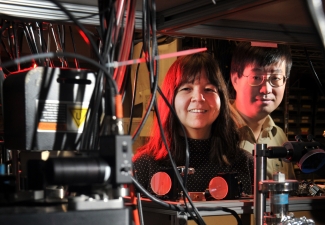Fellows Jun Ye and Deborah Jin (1968–2016) have been named Highly Cited Researchers for 2016 by Thomson Reuters. Highly Cited Researchers is an annual list that recognizes leading researchers from around the world based on an analysis of their research publications The 2016 list recognizes the most-cited authors of research publications in the period 2004 through 2014. Ye and Jin are two of 110 people in the physics category in this year's list.
This is a particularly poignant accolade for JILA, as Deborah Jin passed away on September 15, 2016.
“This honor reinforces the huge impact Debbie Jin had on science and on people during her career,” said Tom O’Brian, Quantum Physics Division chief at JILA. “As Jun well knows, Debbie remained as active as possible in her research over the past year, with wonderful support from him and Eric Cornell. Her inclusion again on the list of most highly cited scientists is bittersweet––demonstrating the enormous impact Debbie had on physics and the great loss we are all feeling.”
Congratulations to Jun Ye for being a Highly Cited Researcher. Best wishes to him going forward with his work on quantum simulation, the world’s most accurate optical atomic clock, and the creation of ultracold potassium-rubidium molecules, a project envisioned in 2002 by the team of Jin and Ye, first achieved in 2008, and followed by years of trend-setting experiments in ultracold chemistry.



 The Physics Frontiers Centers (PFC) program supports university-based centers and institutes where the collective efforts of a larger group of individuals can enable transformational advances in the most promising research areas. The program is designed to foster major breakthroughs at the intellectual frontiers of physics by providing needed resources such as combinations of talents, skills, disciplines, and/or specialized infrastructure, not usually available to individual investigators or small groups, in an environment in which the collective efforts of the larger group can be shown to be seminal to promoting significant progress in the science and the education of students. PFCs also include creative, substantive activities aimed at enhancing education, broadening participation of traditionally underrepresented groups, and outreach to the scientific community and general public.
The Physics Frontiers Centers (PFC) program supports university-based centers and institutes where the collective efforts of a larger group of individuals can enable transformational advances in the most promising research areas. The program is designed to foster major breakthroughs at the intellectual frontiers of physics by providing needed resources such as combinations of talents, skills, disciplines, and/or specialized infrastructure, not usually available to individual investigators or small groups, in an environment in which the collective efforts of the larger group can be shown to be seminal to promoting significant progress in the science and the education of students. PFCs also include creative, substantive activities aimed at enhancing education, broadening participation of traditionally underrepresented groups, and outreach to the scientific community and general public.